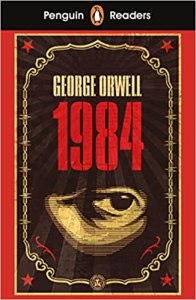
Practise reading comprehension skills with this interactive exercise about the life and works of author George Orwell.
About this Exercise
- Type: Reading Comprehension.
- Level: B2
- Question Types:
- Suggested Time: 10 minutes.
- Instructions: Read this article about the life and works of British author George Orwell and answer the reading comprehension questions below.
- Disclosure: This article includes links to the recommended books on Amazon. Onlearn.es makes a commission for purchases made through the following links.
The Language of Dystopia
George Orwell.
“George Orwell” has become an important figure in British fiction and his books have left a lasting legacy on the way we perceive our relationships with authority and politics. In fact we often describe negative aspects of state surveillance and control as being “Orwellian”, but who was Orwell and what did he write about?
Although Orwell was born as Eric Blair in India during the time of the British Empire, where his father was responsible for the production of opium for the Chinese market, he was raised and educated in Suffolk in the UK. It was from this time in Suffolk that Blair would later take the pen name George Orwell. The name was inspired by a combination of the name of the British Monarch George I and one of his favourite local spots; The River Orwell. He considered the name “George Orwell” to be more resonant of British culture and tradition.
Orwell graduated from the prestigious Eton College, but was apparently not popular with academic staff at the college, perhaps due to his distrust of authority figures. However, Orwell subsequently described that he had been “relatively happy” with the independence that he had enjoyed during his time at Eton.
After graduating from Eton in 1921, Orwell was unable to continue his studies, as he did not qualify for a scholarship and his father’s salary was not sufficient to pay for university fees. With little other choice at the time, Orwell left the UK and joined the Imperial Indian Police in Burma. During this time he began to foment hatred for imperialism and authoritarianism, the development of which can be seen in his first published works under the name George Orwell; the essays “A Hanging” and “Killing an Elephant.”
On returning to the UK Orwell fell into somewhat abject poverty and became homeless, as described in his book “Down and Out in Paris and London.” Orwell climbed his way out of poverty by taking on manual work, then finding work as a schoolteacher. Unfortunately, due to poor health, Orwell was unable to continue teaching and moved into the world of retail, working as an assistant bookseller in London, as documented in his book “Keep the Aspidistra Flying”.
Spanish Civil War
When civil war broke out in Spain, Orwell was motivated to join the fight against fascism, or, as he said “for common decency”. At the end of 1936, Orwell travelled to Barcelona, the capital of Catalonia. At the time, Catalonia’s republican Government was supported by a coalition of Marxist, anarchist, socialist and communist organisations. Orwell, being a sympathiser of the the Independent Labour Party, was motivated to join its counterpart organisation in Spain, the POUM (Workers’ Party of Marxist Unification).
After joining the militia Orwell was sent to the Aragon front, where he was promoted to corporal based on his previous experience with the Cadet Corps and the police. After a cold and difficult but completely uneventful January in the mountains of Aragon, Orwell was joined by other British members of the Independent Labour Party and they were sent to fight in Huesca.
In Huesca, Orwell finally found the action that he had been hoping for and after chasing fascists with his bayonet and bombing enemy sniper positions his militia returned to Barcelona. After returning to Aragon he was shot in the neck and seriously injured. Orwell was taken first to Lleida, then Tarragona and finally returned to Barcelona where he recovered.
By the time they returned to Barcelona, the political unity of the coalition that supported the government had collapsed. Orwell recorded how the atmosphere in the city had become dangerous and desperate. The Communist party, supported and funded by Russia had declared other factions to be Trotskyist, fascist or Nazi and had begun to arrest and imprison their members. Former comrades now became fierce adversaries and Orwell and his militia had become under attack. Orwell went into hiding and escaped to France by train. After returning to England, Orwell and the rest of his militia were put on trial in his absence, charged with “Trotskyism”. Orwell observed the trials from a distance and commented that the trials were based on lies, absurdities and communist propaganda. It was these experiences at the hands of his former comrades, the communists, that would later inspire his two major novels, Animal Farm and 1984. Orwell wrote and published an account of his time in Catalonia during the SPanish Civil War in the book “Homage to Catalonia”. The book might be especially interesting to any residents of Bartcelona thanks to it’s accounts of his time in the centre of the city, on Las Ramblas, which he describes in great detail.
In 1996, Barcelona council named a plaza “Plaça de George Orwell” to honour Orwell’s efforts against fascism. The plaza, which is near to the Ramblas, is locally known as “Plaza Tripi”.
Nineteen Eighty-Four

In 1984, civilisation has been ravaged by world war, civil conflict, and revolution. Airstrip One (formerly known as Great Britain) is a province of Oceania, one of the three totalitarian super-states that rule the world. It is ruled by “The Party” under the ideology of “Ingsoc” (a Newspeak shortening of “English Socialism”) and the mysterious leader Big Brother, who has an intense cult of personality. The Party brutally purges out anyone who does not fully conform to their regime, using the Thought Police and constant surveillance through telescreens (two-way televisions), cameras, and hidden microphones. Those who fall out of favour with the Party become “unpersons”, disappearing with all evidence of their existence destroyed.
“Who controls the past controls the future. Who controls the present controls the past.”
“Doublethink means the power of holding two contradictory beliefs in one’s mind simultaneously, and accepting both of them.”
― George Orwell, 1984
Winston Smith re-writes history for the Ministry of Truth in Oceania. Big Brother and the Thought Police watch everyone for signs of Thought Crime. But when Winston falls in love with Julia, he begins to have new ideas and hopes. Winston and Julia start to question the world that they live in – but Big Brother does not like independent thought.
The Penguin reader edition of this book is specially adapted for learners at B2 level of the CEFR. With that in mind, this book would be an excellent way to see plenty of examples of grammatical forms and tenses that will help to consolidate their understanding. Exclusively with this edition, readers can unlock online resources including a digital copy of the book, the audiobook edition and exercises! This edition is a strongly recommended and provides a great way for learners to both improve their English and enjoy what has become a classic novel.
Animal Farm

Animal Farm is a beast fable, in the form of satirical allegorical novella, by George Orwell, first published in England on 17 August 1945. It tells the story of a group of farm animals who rebel against their human farmer, hoping to create a society where the animals can be equal, free, and happy. Ultimately, the rebellion is betrayed, and the farm ends up in a state as bad as it was before, under the dictatorship of a pig named Napoleon.
According to Orwell, Animal Farm reflects events leading up to the Russian Revolution and then on into the Stalinist era of the Soviet Union. Orwell, a democratic socialist, was a critic of Joseph Stalin and hostile to Moscow-directed Stalinism, an attitude that was critically shaped by his experiences during the May Days conflicts between the POUM and Stalinist forces during the Spanish Civil War. In a letter to Yvonne Davet, Orwell described Animal Farm as a satirical tale against Stalin (“un conte satirique contre Staline“), and in his essay “Why I Write” (1946), wrote that Animal Farm was the first book in which he tried, with full consciousness of what he was doing, “to fuse political purpose and artistic purpose into one whole”.
*Adapted from various pages of the Wikipedia.

